
Jonathan Bruce Postel was an American computer scientist who made many significant contributions to the development of the Internet, particularly with respect to standards. He is known principally for being the Editor of the Request for Comment (RFC) document series, for Simple Mail Transfer Protocol (SMTP), and for administering the Internet Assigned Numbers Authority (IANA) until his death. During his lifetime he was referred to as the "god of the Internet" for his comprehensive influence; Postel himself noted that this "compliment" came with a barb, the suggestion that he should be replaced by a "professional," and responded with typical self-effacing matter-of-factness: "Of course, there isn’t any 'God of the Internet.' The Internet works because a lot of people cooperate to do things together."

Stephen D. Crocker is an Internet pioneer. In 1969, he created the ARPA "Networking Working Group" and the Request for Comments series. He served as chair of the board of the Internet Corporation for Assigned Names and Numbers (ICANN) from 2011 through 2017.

Vinton Gray Cerf is an American Internet pioneer and is recognized as one of "the fathers of the Internet", sharing this title with TCP/IP co-developer Bob Kahn. He has received honorary degrees and awards that include the National Medal of Technology, the Turing Award, the Presidential Medal of Freedom, the Marconi Prize, and membership in the National Academy of Engineering.
The Internet Architecture Board (IAB) is "a committee of the Internet Engineering Task Force (IETF) and an advisory body of the Internet Society (ISOC). Its responsibilities include architectural oversight of IETF activities, Internet Standards Process oversight and appeal, and the appointment of the Request for Comments (RFC) Editor. The IAB is also responsible for the management of the IETF protocol parameter registries."

The Internet Society (ISOC) is an American nonprofit advocacy organization founded in 1992 with local chapters around the world. Its mission is "to promote the open development, evolution, and use of the Internet for the benefit of all people throughout the world." It has offices in Reston, Virginia, U.S., and Geneva, Switzerland.

David J. Farber is a professor of computer science, noted for his major contributions to programming languages and computer networking. He is currently the Distinguished Professor and Co-Director of Cyber Civilization Research Center at Keio University in Japan. He has been called the "grandfather of the Internet".

Tarek Kamel was an Egyptian politician and computer engineer expert in global Internet governance issues.

Internet governance consists of a system of laws, rules, policies and practices that dictate how its board members manage and oversee the affairs of any internet related-regulatory body. This article describes how the Internet was and is currently governed, some inherent controversies, and ongoing debates regarding how and why the Internet should or should not be governed in future.

Veni Milanov Markovski is a Bulgarian Internet entrepreneur, co-founder and CEO of the Bulgarian ISP bol.bg. He is currently ICANN's Vice-President for UN engagement, based in New York.
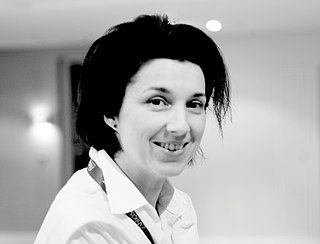
Désirée Zeljka Miloshevic is an Internet public servant, and was a special advisor to the chair of the United Nations' Internet Governance Forum Multi-stakeholder Advisory Group. Additionally, she is Senior Public Policy and International Affairs Advisor in Europe for Afilias, the domain name registry.
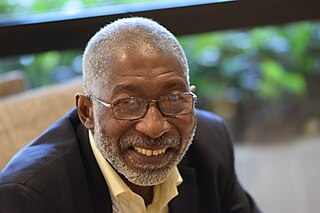
Nii Narku Quaynor is a Ghanaian scientist and engineer who has played an important role in the introduction and development of the Internet throughout Africa.

John C. Klensin is a political scientist and computer science professional who is active in Internet-related issues.
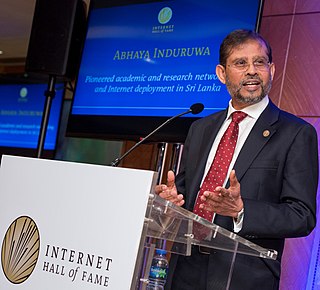
Abhaya Induruwa is the inaugural Professor V K Samaranayake Endowed Professor of Computing, University of Colombo School of Computing, Sri Lanka. Having served as the Director of Cyber Innovation Hub he recently retired from the Canterbury Christ Church University in the United Kingdom where he researched into security and forensic investigation of Internet of Things (IoT). Currently he is engaged in promoting IoT in digital agriculture as a disruptive technology, primarily in developing countries, leading to smart agriculture resulting in higher yields in food production. Induruwa is considered the father of Internet in Sri Lanka.

Satish Babu is a Free Software activist, early Internet advocate, and development professional based out of Kerala, India. He is the founding Director of the International Centre for Free and Open Source Software (ICFOSS), an autonomous academic/research institution of the Government of Kerala, India, where he worked from March 2011 to September 2015. He was earlier the CEO of SIFFS, an NGO of small-scale artisanal fishers of south India; a co-founder and President of InApp Information Technologies; and is associated with international and national professional societies such as IEEE, Internet Society (ISOC), ICANN, and the Computer Society of India (CSI).

Dennis M. Jennings is an Irish physicist, academic, Internet pioneer, and venture capitalist. In 1985–1986 he was responsible for three critical decisions that shaped the subsequent development of NSFNET, the network that became the Internet.
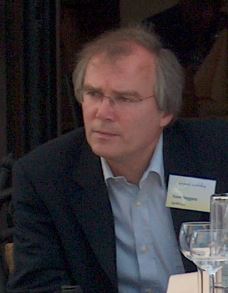
Cornelis Adrianus Maria "Kees" Neggers is a Dutch Internet pioneer. He is best known for starting and promoting many initiatives for international collaboration in research and education networking.
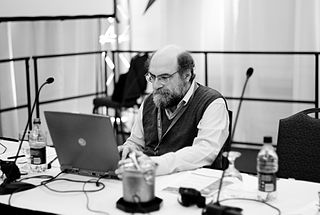
Demi Getschko is a Brazilian computer scientist who is considered one of the pioneers of the Internet in Brazil. He currently is the CEO of NIC.br.

Eduardo Tadao Takahashi was a Brazilian computer scientist and researcher who was credited with contributions toward planning, deployment, and adoption of the internet in Brazil and other Latin American countries. He was a founding director of Brazil's National Research Network (RNP), an academic network that coordinated actions toward setting up the country's national internet backbone. He was inducted into the Internet Hall of Fame in 2017.

Nabil Bukhalid was a Lebanese computer scientist and founder of the Lebanese Academic and Research Network. He is a Internet Hall of Fame Inductee and he was one of the key figures responsible for introducing the Internet to Lebanon and establishing the Lebanese Domain Registry. He is commonly referred to as the "Father of the Internet" in Lebanon.

















